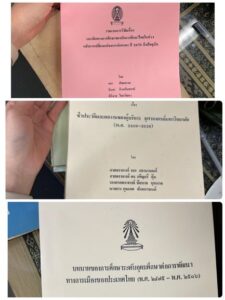「自然-社会的なもの」としての水の利用・分配に関する研究――東アフリカ乾燥地の町における事例をもとに――
対象とする問題の概要 東アフリカの乾燥・半乾燥地域に分布する牧畜社会を対象にした民族誌的研究では、「水」は不足しがちな天然資源として捉えられてきた。そして、水不足の問題が人道的・倫理的な介入の対象となってきた。それゆえ、この地域を対象にし…
The study of Thai studies is not new; however, the focus on institutionalization and the attempt to produce self-area studies during the Cold War has rarely been mentioned. Thai studies in this research more or less represent the expansion of Area Studies in Southeast Asia which significantly developed during and after the Cold War. The effort to understand from within and an awareness of the dominant Western thought will bring us to a bigger discussion on the East-West dynamics in knowledge production.
From the data collected, I could trace the anti-Western knowledge sentiment in the formative years of transforming social science from practitioner training to academics. The academic movement was triggered by the huge support provided by the US in conducting research as part of the counter-insurgency plan against the Communists as well as the nation-building process at the national level. These factors pushed the institutionalization of Thai studies as a newly established academic field with a mission to serve the state’s nationalist agenda.
Thammasat University was the first founding research institute in 1971, followed by Chulalongkorn University in 1974. Archives from Thammasat and Chulalongkorn University also showed that the development of the Thai Studies Institute was influenced by regional and national politics back then.
Understanding “Thai studies” in Thailand during the Cold War not only reflects the dynamics of knowledge in the post-colonial era but also raises a question on the future direction of area studies in general.

Photo 2: Some research collected from Chulalongkorn University
During around two months of my fieldwork, I delved into numerous archives and conducted research at Thai Studies institutes in both Thammasat and Chulalongkorn University. This endeavor aimed to comprehend their evolution from their inception in the 1970s to the conclusion of the Cold War in the early 1990s. Compiling a list of 419 research projects from these institutes from 1971 to 1997, I realized shifts in research themes. Consequently, I categorized them into four sub-periods corresponding to the socio-political landscape: the first period from 1971 to 1975, the second from 1976 to 1980, the third from 1981 to 1991, and the fourth from 1992 to 1997. Additionally, I established four primary categories based on research themes: arts and culture, development and economics, politics, and others.
During the initial period, around 40 percent of the research pertained to arts and culture. Subsequently, in the second and third sub-periods, the focus shifted towards development and economics, encompassing approximately 40 to 60 percent of the research in these periods. This trend coincided with the strong political campaign against communism from the mid-1970s to the late 1980s, prompting Thai Studies Institutes affiliated with the two public universities to generate knowledge supportive of military efforts. The final sub-period, spanning from 1992 to 1997, saw a majority of research still centered around economics and development, accounting for 37 percent. However, this was accompanied by a rise in research within the “Others” category, encompassing diverse issues such as Tai ethnicity, social concerns in neighboring countries, and scientific topics. This indicates the institutes’ endeavors to adapt to the post-war socio-political climate.
Throughout my fieldwork, I collected and digitized research materials representing each sub-period for further textual analysis, which will be instrumental in contextualizing my analysis within the broader framework.
I intend to conduct a thorough analysis of the evolution of Thai Studies Institutes in Thailand throughout the Cold War period. This analysis will be conducted through a combination of textual and contextual frameworks.
Copyright © 附属次世代型アジア・アフリカ教育研究センター All Rights Reserved.